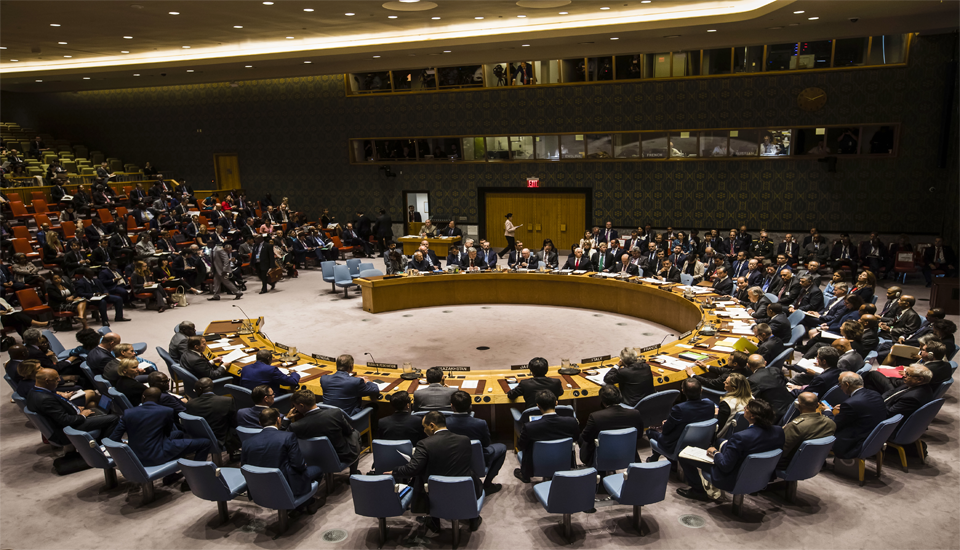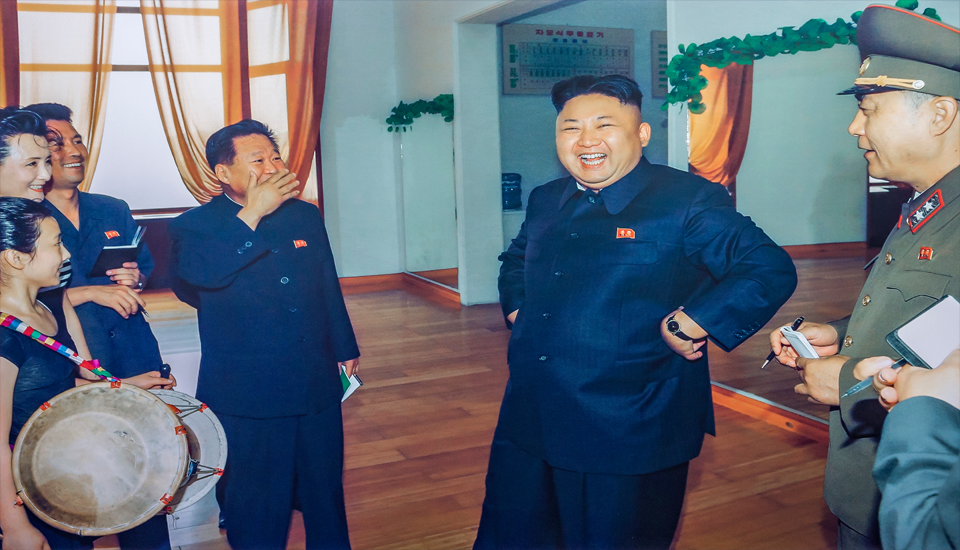
China’s Stance on North Korea’s “New Cold War” Narrative
Commentary | February 27, 2023
Dong Ryul Lee
Professor at Dongduk Women's University
Dong Ryul Lee, Chair of the China Research Center at EAI (Professor at Dongduk Women’s University), highlights that although China and North Korea might seem to have a close relationship, Beijing maintains a reserved stance regarding the North’s perspective on its strategic value amid the US-China competition. Professor Lee explains that Xi Jinping prioritizes political stability by boosting the economy and tries to avoid a full-scale confrontation with the US. Accordingly, China seeks to manage the risk spurred on by Pyongyang’s military provocations, given that they legitimize stronger US-Japan-ROK trilateral security cooperation.
Amid the continuing launch of ballistic missiles, North Korea is highlighting its geopolitical importance in the ongoing confrontation between China and the United States by presenting the theory revolving around ideas such as ‘New Cold War’ and ‘geopolitical pivot.’ North Korea also advocates “multipolarization theory,” emphasizing that the world has transformed into a multipolar system due to the decline of US hegemony and the continued rise of China. North Korea seeks to promote strategic solidarity with China and Russia to counter the United States. In fact, North Korea also considers the US threat towards China as a conflict between imperialism and socialism and insists on socialist solidarity between North Korea and China.
In the face of the intensifying US-China strategic rivalry and the suspension of dialogue between the two Koreas as well as between North Korea and the United States, on the surface, North Korea and China seem to be closer. For instance, freight train service between Sinuiju and Dandong resumed in September 2022, and traffic for trucks between Rason and Hunchun was reportedly resumed in February 2023. In particular, North Korea is clearly siding with China when it comes to the issue of Taiwan, which has been at the forefront of the US-China conflict. For example, Myung Ho Park, the Vice Minister of Ministry of Foreign Affairs of North Korea, strongly condemned the United States by saying that “the United States has recently been escalating military tensions by encouraging the independence of Taiwan, which is an inseparable territory of China.” North Korea has clear reasons for actively pursuing a strategic alliance with China. North Korea desperately needs China’s cooperation to help it recover from economic difficulties brought on by UN sanctions and to prevent further sanctions in the future. In fact, China has opposed further sanctions on North Korea’s ballistic missile launches, arguing that the UN Security Council should "address North Korea's rational concerns in an impartial manner.”
China, amid competition with the United States, is having difficulties securing partners for building a global network into order to achieve its strategic goals. China values its relationship with North Korea, referring to them as a traditional ally. So much so that China also delivered a diplomatic congratulatory message, emphasizing its “friendly and cooperative relations” with North Korea. However, while China agrees with North Korea on the concept of the ‘multipolarity’ of the world, it maintains a reserved position regarding North Korea’s ‘new Cold War’ theory. Rather, China is criticizing the threat and aggression of the United States for replicating the ‘Cold War mentality.’ In other words, the Ministry of Foreign Affairs of China stated that the Chinese government “urges the US to abandon the Cold War mentality and zero-sum game mindset,” and to “stop presuming others’ behavior based on its own pattern and stop wantonly criticizing and denigrating China.”[1] China also promoting concepts that are in line with the ‘New Era’ such as the ‘New Type of International Relations’ and a ‘Community with a Shared Future,’ thus distinguishing itself from the ‘Cold War mentality.’ There are reasons why China cannot fully subscribe to the concept of North Korea’s ‘new Cold War’ and promote strategic solidarity between North Korea, Russia and China.
First, considering the reality the Xi administration is facing, it is urgent for Xi Jinping to stabilize his regime and boost the economy. The diplomacy of China should focus on creating an external environment and conditions favorable for such political priorities. In the 20th Party Congress, Xi Jinping has listed a number of domestic tasks and goals, which included the building of a "great modern socialist country,” building “self-reliance and strength in science and technology,” “cultivating a large workforce of high-quality talent,” improving “public wellbeing,” ensuring “stronger ecological conservation,” and “achieving common prosperity” for “socialist modernization.” North Korea represents two different strategic implications for China. While China recognizes the strategic value of North Korea amid growing confrontation and competition with the United States, it is also concerned about the security issues created by its neighbor’s actions. North Korea continues to undermine the security near China’s borders with its nuclear crisis, missile provocations, and economic woes. China also attempts to manage the security issues stemming from North Korea through continuously emphasizing the necessity of “strategic communication.” In summary, China considers North Korea as both a strategic ally and a nation that should be both managed and controlled in the name of regional stability.
Second, while China and North Korea share a strategic interest in countering the United States, they both prioritize their relationship with the United States over their relationship with each other. Although North Korea is taking China’s side in the US-China confrontation, China, unlike North Korea, has made the ‘US factor less prominent when discussing its relations with North Korea. China thinks the time is not yet ripe for an all-out hegemonic competition with the United States and is actively seeking strategies to avoid such situation. China needs to maintain its relationship with North Korea to manage the rapid changes on the Korean peninsula, including North Korea’s regime crisis, ongoing provocations, and possibility of improved North Korean-US relations. However, China is unwilling to escalate the conflict with the United States because of North Korean nuclear issues. Therefore, it is unlikely that China will support North Korea to the extent of violating UN sanctions, contrary to what Pyongyang expects. China will also continue to engage in limited military and security cooperation with North Korea unless it faces an inevitable military confrontation with the United States.
Third, there is a marked difference between the position of China and North Korea towards Russia’s invasion of Ukraine. North Korea is openly supporting Russia and condemning the United States over the crisis in Ukraine. North Korea has made it clear that it intends to strengthen its strategic cooperation with Russia through the Ukraine crisis. China, on the other hand, has refrained from making clear statements of support. Instead, China presented a principled but vague four-pronged approach to resolve the Ukraine crisis: uphold the UN Charter, take into account the legitimate security concerns of the interested parties, resolve the conflict through dialogue, and develop a security framework in Europe that can ensure long-term stability in the region. China has consistently emphasized the importance of non-intervention and defending its territorial sovereignty. As strategic competition between China and the United States intensifies, China faces a difficult situation in which strategic cooperation with Russia as a friendly ally is important, but not to the point of compromising core principles of Chinese diplomacy: sovereignty and territorial rights. Despite receiving criticism from the international community, China has continued its economic cooperation with Russia and opposed sanctions led by the United States. However, China is not responding to Russia’s request for military support. In short, China wants to avoid further escalation with the United States and European countries over the Ukraine crisis.
Fourth, North Korea is seeking solidarity between North Korea, China, and Russia to look for a way to evade sanctions and isolation. To that end, North Korea has been using ROK-US-Japan trilateral cooperation as a springboard to spur on North Korea-China-Russia solidarity. However, China is growing ever more wary of the increased security cooperation among South Korea, the United States, and Japan. China is concerned that North Korea’s continued provocations could be used as justification for South Korea to further strengthen security cooperation with Japan and the United States and deploy US strategic assets on the Korean Peninsula. In fact, support for trilateral security cooperation between the ROK, Japan, and US has been increasing. For example, in South Korea, positive responses to strengthening trilateral security cooperation increased to 53.6% in 2020, 64.2% in 2021, and 72.4% in 2022. Likewise, in 2022, 73.9% of the citizens in Japan supported the trilateral security cooperation for the peace and stability of the Korean peninsula.
In November 2022, the three countries held a trilateral summit meeting in Cambodia and issued the “Phnom Penh Statement”, which covered issues such as trilateral cooperation against North Korea’s nuclear and missile threats, strengthening extended deterrence, and economic and security cooperation. China is concerned that such trilateral security cooperation will revolve around the US-Japan alliance and eventually shift to target China rather than North Korea. In particular, China is wary of the possibility that such trilateral security cooperation could extend beyond the Korean Peninsula and move towards issues like Taiwan. Because of this, China has not been keen to promote trilateral cooperation with Russia and North Korea so far, as such attempt might provide a rallying point for ROK-US-Japan cooperation. China is in a dilemma in which they desperately need to have more allies, however they also should refrain from tarnishing its image abroad and avoid any further deterioration of its relationship with the United States.
In essence, while China and North Korea seem to display a close relationship in appearance, both countries are going through complex and divergent strategic calculations behind the scenes. Although China and North Korea share a motivation for strategic cooperation - countering the United States - they have different approaches and plans when it comes to the issue of making the best use of the US factor. While North Korea struggles to find a way out of isolation and economic hardship by taking advantage of the US-China strategic rivalry and at the same time seeks for opportunities to be at the negotiating table with the United States, China tends to focus on domestic issues, delaying a full-scale confrontation between the United States as much as possible. Thus, China does not want to escalate tensions with the United States because of North Korea and attempts to control the increasing security anxiety caused by North Korea.■
[1] Embassy of the People’s Republic of China in the Kingdom of Bahrain, 2020, “Foreign Ministry Spokesperson Zhao Lijian's Regular Press Conference on June 30, 2020,” http://bh.china-embassy.gov.cn/eng/fyrth/202006/t20200630_1048794.htm (Accessed: February 23, 2023)
■ Dong Ryul Lee is a professor at the Department of Chinese Studies of the Dongduk Women’s University since 1997. He is now a chair at China Research Panel of East Asia Institute (EAI). Previously, he served as a policy advisor to the Republic of Korea Ministry of Unification and an executive committee member in the Joint Committee of Experts for Korea-China Strategic Cooperative Partnership. He was also an editor of The Journal of Contemporary China Studies in Korea (2010-2011). He was a visiting scholar in the Weatherhead East Asian Institute, Columbia University from August 2005 to August 2006. He received his Ph.D. in the Department of International Politics, Peking University in 1996. He has published many scholarly articles, monographs, and edited books, including Global Superpower Prospects for China’s Future (2011), “China’s Policy and Influence on the North Korea Nuclear Issue: Denuclearization and/or Stabilization of the Korean Peninsula?” in The Korean Journal of Defense Analysis (2010), China’s Territorial Dispute (2008), and “Chinese Diplomatic Behavior in the United Nations” (2007). His research area includes Chinese foreign policy, international relations in East Asia, Chinese nationalism and minority.
■ Typeset by Junghoo Park, Research Associate
For inquiries: 02 2277 1683 (ext. 205) | jhpark@eai.or.kr
Security and External Relations

Re-Declared “Frontal Breakthrough”: North Korea’s Nuclear First Line in 2023 and Its Limitations
Won Gon Park | 08.February.2023

Divining the North Korean Nuclear Problem in a Multipolar World
Taesuh Cha | 16.December.2022

A Decade Under the Millennial Supreme Leader Kim Jong-Un
Jeong Won Na | 12.December.2022
LIST